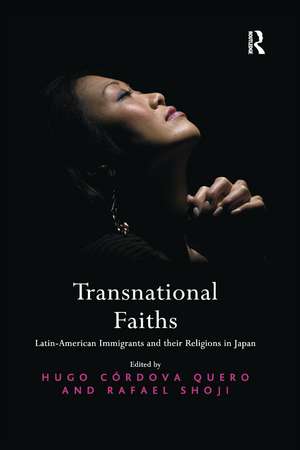Transnational Faiths: Latin-American Immigrants and their Religions in Japan
Autor Hugo Córdova Quero, Rafael Shojien Limba Engleză Paperback – 11 oct 2016
| Toate formatele și edițiile | Preț | Express |
|---|---|---|
| Paperback (1) | 469.34 lei 6-8 săpt. | |
| Taylor & Francis – 11 oct 2016 | 469.34 lei 6-8 săpt. | |
| Hardback (1) | 1059.00 lei 6-8 săpt. | |
| Taylor & Francis – 28 apr 2014 | 1059.00 lei 6-8 săpt. |
Preț: 469.34 lei
Nou
Puncte Express: 704
Preț estimativ în valută:
89.81€ • 94.44$ • 74.21£
89.81€ • 94.44$ • 74.21£
Carte tipărită la comandă
Livrare economică 17 aprilie-01 mai
Preluare comenzi: 021 569.72.76
Specificații
ISBN-13: 9781138273665
ISBN-10: 113827366X
Pagini: 284
Dimensiuni: 156 x 234 x 15 mm
Greutate: 0.45 kg
Ediția:1
Editura: Taylor & Francis
Colecția Routledge
Locul publicării:Oxford, United Kingdom
ISBN-10: 113827366X
Pagini: 284
Dimensiuni: 156 x 234 x 15 mm
Greutate: 0.45 kg
Ediția:1
Editura: Taylor & Francis
Colecția Routledge
Locul publicării:Oxford, United Kingdom
Cuprins
Contents: Foreword; Introduction: on transnational faiths and their faithfuls, Hugo Córdova Quero and Rafael Shoji; The making of ’Brazilian Japanese’ Pentecostalism: immigration as a main factor for religious conversion, Rafael Shoji; ’Bestowing the light of the Gospel in Japan’: the formation of an ethnic church in the Dekassegui community, Masanobu Yamada; The potentiality of Brazilian immigrants’ religious communities as social capital: the case of Christian churches in Toyohashi under an economic depression, So Hoshino; Diversity and education: Brazilian children and religious practices in everyday life at Japanese public schools, Nilta Dias; Citizenship of God: female sex workers and the Roman Catholic Church’s advocacy for human rights, Marcela Inés Méndez Vázquez; Transnational believers: understanding the religious experiences of Peruvian immigrants in Japan, Olmes Milani; The activities of Soka Gakkai and Sekai KyÅ«seikyÅ among Japanese Brazilians in Japan, Regina Yoshie Matsue; Becoming Brazilian in Japan: umbanda and ethnocultural identity in transnational times, Ushi Arakaki; Transcendental communications: the reinterpretation of the Brazilian Spiritist continuum in Japan, Rafael Shoji and Hugo Córdova Quero; Bibliography; Index.
Notă biografică
Dr Hugo Córdova Quero holds a Ph.D. from the Department of Interdisciplinary Studies at the Graduate Theological Union at Berkeley, with allied field at the Department of Ethnic Studies, University of California at Berkeley. He received a Master in Divinity from ISEDET University in Buenos Aires (1998) and a Master of Arts in Systematic Theology and (Post)Colonial studies from the Graduate Theological Union at Berkeley (2003). He was Professor of Ecumenism at the Santa Maria de Guadalupe Roman Catholic Seminary in Buenos Aires (1998-2001) and visiting scholar at the Chinese University of Hong Kong (2006). He was visiting researcher at the Center for Lusophone Studies, Sophia University (Jesuit), in Tokyo, Japan (2006-2009). His areas of research include theology, ethnic studies, gender studies, critical theories (feminist, queer, and post-colonial), and cultural studies. Dr Rafael Shoji holds a Ph.D. from the Leibniz University of Hanover (Germany) and developed postdoctoral research in the Pontifical University of Sao Paulo and at Nanzan University. He is a co-founder and researcher of the Center for the Study of Oriental Religions (CERAL) at the Pontifical University of Sao Paulo. He has published on Japanese religions in Brazil, Japanese Brazilian culture and comparative studies on Buddhism and Christianity. As a Japanese Studies fellow of the Japan Foundation at the Nanzan Institute for Religion and Culture (Nagoya, Japan) he was recently engaged in research on the religions among Brazilians in Japan, especially the reinterpretation of Christianity.
Recenzii
"..this edited volume provides a very important contribution to the study of religion in East Asia and is highly recommended to scholars in this field as well as to all those interested in transnational religion and in the broader issue of cultural hybridity."- Ugo Dessì, Cardiff University
Descriere
Japan has witnessed the arrival of thousands of immigrants, since the 1990s, from Latin America, especially from Brazil and Peru. This book exposes and explores the often missed connection of the positive role of religion and faith-based communities in facilitating varied integrative ways of belonging for immigrants. The authors highlight the faith experiences of immigrants themselves by bringing their voices through case studies, interviews, and ethnographic research throughout the book to offer an important contribution to the exploration of multiculturalism in Japan.











